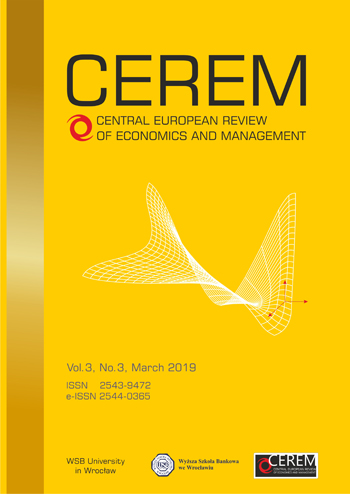Sustainability in higher education from the perspective of business ethics and corporate sustainability
DOI:
https://doi.org/10.29015/cerem.853Keywords:
business ethics, corporate sustainability, higher education for sustainable development, interdisciplinary approachesAbstract
Aim: In this epilogue to the special issue, the author provides a reflection on the commonalities between the origins of business ethics and corporate sustainability on the one hand, and Higher Education for Sustainable Development on the other hand.
Design / Research methods: The paper is reflective and provides future avenues to further develop the fields of business ethics, corporate sustainability, and Higher Education for Sustainable Development.
Conclusions / findings: Although both fields developed independently, they share the same focus on interdisciplinary studies, integrated thinking, and looking beyond the short term and local interests.
Originality / value of the article: In the end, both disciplines are carried by a fundamental normative choice for an inclusive, sustainable society, a choice that should never be forgotten and is the horizon of all our research.
References
Dernbach J.C. (ed. 2002), Stumbling toward sustainability. Environmental Law Institute, Washington.
Lambrechts W., Van Liedekerke L., Van Petegem P. (2018), Higher education for sustainable development in Flanders: balancing between normative and transformative approaches, “Environmental Education Research”, vol. 24 no. 9, pp. 1284-1300.
Lambrechts W., Mulà I., Ceulemans K., Molderez I., Gaeremynck V. (2013), The integration of competences for sustainable development in higher education: an analysis of bachelor programs in management. “Journal of Cleaner Production”, vol. 48, pp. 65-73.
Levin K., Cashore B., Bernstein S., Auld G. (2012), Overcoming the tragedy of super wicked problems: constraining our future selves to ameliorate global climate change, “Policy sciences”, vol. 45 no. 2, pp. 123-152.
Lozano R., Lukman R., Lozano F. J., Huisingh D., Lambrechts W. (2013), Declarations for sustainability in higher education: becoming better leaders, through addressing the university system, “Journal of Cleaner Production”, vol. 48, pp. 10-19.
Sutton J.F. (1998), Disembodied Capitalism: Habermas conception of the Economy, “Sociological Forum”, vol. 13, no. 1, pp. 61-83.
Tawney R. (1998), Religion and the Rise of Capitalism. Transaction Publishers, 337p.
Van Liedekerke L., Dubbink W. (2008), Twenty years of European business ethics–past developments and future concerns, “Journal of Business Ethics”, vol. 82 no. 2, pp. 273-280.
Vogel D. (2005), The Market for Virtue. Brookings Institution Press, 222p.
Downloads
Published
Issue
Section
License
The aim of CEREM is to make scientific work available in accordance with the principle of open access. The rules mentioned below are important, as they enable CEREM and its publisher, the WSB Merito University in Wroclaw, to distribute the scientific work to a wide public while complying with specific legal requirements, at the same time protecting the rights of the authors.
The author transfers to the WSB Merito University in Wroclaw, free of charge and without territorial limitations, with all proprietary copyrights to the said piece of work in the understanding of the act of 4th February 1994 on copyrights and derivative rights (Journal of Laws of 1994, no. 24, item 83, as amended) on an exclusivity basis, i.e. the rights to:
1. Make the piece of work in question available via the Digital Library established by the WSB Merito University in Wroclaw.
2. Produce, record and reproduce in multiple copies the piece of work using any techniques whatsoever, including printing, reprography, magnetic recording and digital processing, and particularly its reproduction by recording on CDs and similar data carriers,
3. Use fragments of the piece of work for promotional purposes in publications, promotional materials, the Internet and Intranet type networks managed by the WSB Merito University in Wroclaw.
4. Store the piece of work into computer databases managed by the WSB Merito University in Wroclaw.
5. Copy and reproduce the piece of work using photo-mechanic technologies other than those commonly known at the time of the signature hereof (photocopies, Xerox copies etc.),
6. Process the piece of work, transferring it into an electronic form, and distribute it on the Internet without limitations.


